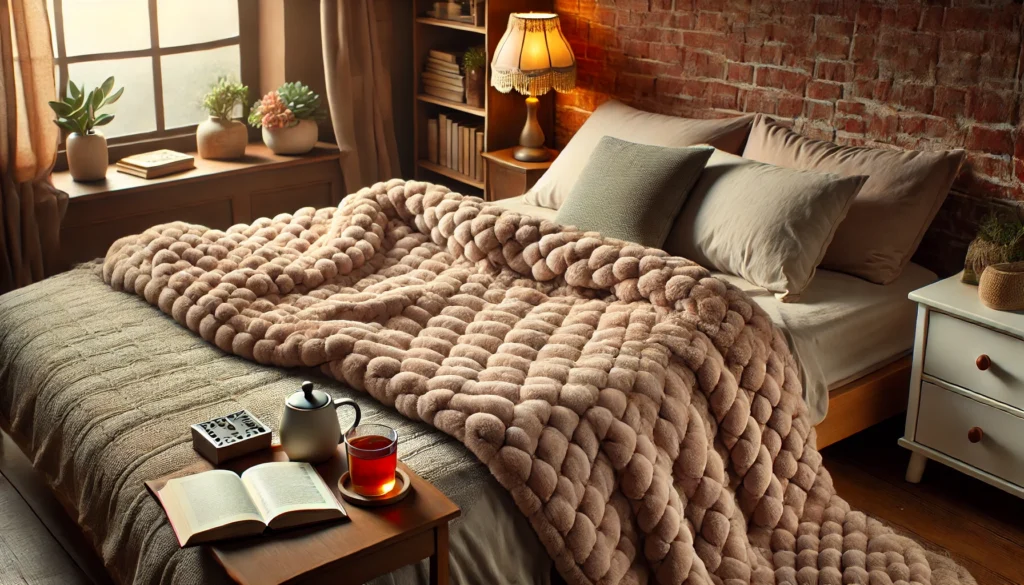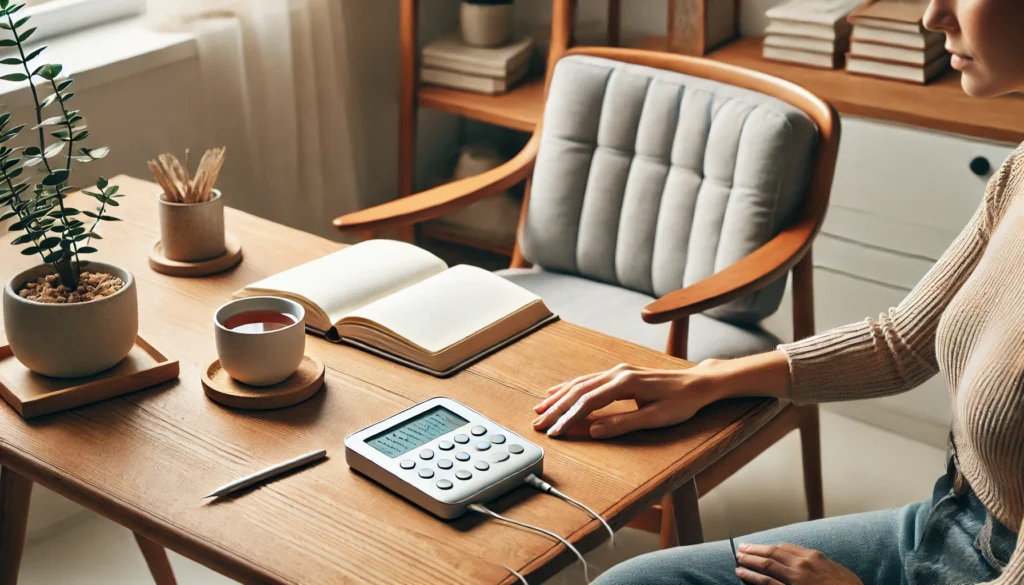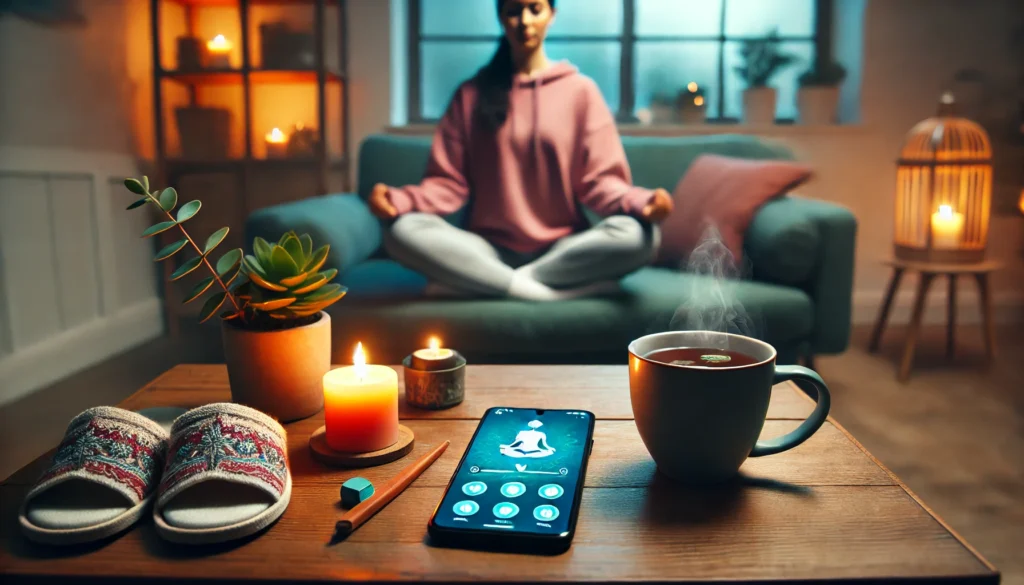Anxiety disorders are among the most common mental health conditions, affecting approximately 40 million adults in the United States alone. These disorders can manifest in various forms, including generalized anxiety disorder, panic disorder, and social anxiety disorder. Understanding the impact of anxiety is crucial in addressing its symptoms effectively.
You may also like: Top 10 Herbs for Stress Relief
The Science Behind Anxiety
Anxiety is a natural response to stress, a signal from your body that something is amiss. It’s rooted in the brain’s amygdala, which processes emotions. When triggered, it can lead to physical symptoms like increased heart rate, rapid breathing, and a heightened state of alertness.
However, anxiety is not solely a biological response. It also involves cognitive processes, where the brain interprets situations as threatening. This interpretation can vary significantly among individuals, leading to different anxiety experiences. Some people may have a genetic predisposition to anxiety, while others may develop it due to environmental factors or traumatic experiences.
Research in neuroscience is continually uncovering how brain chemistry and neural pathways contribute to anxiety. Neurotransmitters such as serotonin, dopamine, and GABA play critical roles in mood regulation. Understanding these biochemical pathways helps in developing targeted treatments for anxiety disorders.
Historical Context of Anxiety Treatment
Historically, anxiety was often misunderstood, with sufferers facing stigma and limited treatment options. Ancient practices, such as meditation and yoga, have long been used for their calming effects, while modern science has introduced pharmaceuticals and cognitive-behavioral therapy as effective treatments. However, the search for more natural and accessible solutions continues.
In ancient times, anxiety was attributed to spiritual or supernatural causes, and treatments often involved rituals or herbal remedies. The Middle Ages saw anxiety as a moral failing, and sufferers were sometimes subjected to harsh treatments or isolation.
The Enlightenment brought a more scientific approach, with early psychologists beginning to study the mind’s role in anxiety. The 20th century marked a significant shift with the development of psychoanalysis and later, cognitive-behavioral therapy. These therapies focused on changing thought patterns to reduce anxiety.
Today, the integration of technology and holistic approaches offers new possibilities. Innovations like virtual reality therapy and biofeedback are emerging, providing alternative methods to traditional treatments. The evolution of anxiety treatment reflects a broader understanding of mental health and the need for diverse approaches.
The Broader Impacts of Anxiety
Anxiety doesn’t just affect the mind; it has a profound impact on physical health and daily life. Chronic anxiety can lead to serious health issues such as heart disease, gastrointestinal problems, and weakened immune function. The stress response triggered by anxiety increases cortisol levels, which can have long-term detrimental effects on the body.
In the workplace, anxiety can reduce productivity and increase absenteeism. Individuals with anxiety might struggle with decision-making, concentration, and interpersonal relationships. This can lead to a cycle of stress and anxiety, impacting job performance and career progression.
Socially, anxiety can isolate individuals, making it difficult to form and maintain relationships. Social anxiety, in particular, can prevent people from engaging in everyday interactions, leading to loneliness and reduced quality of life. Understanding these broader impacts highlights the importance of addressing anxiety comprehensively.

Top 10 Anxiety Relief Products
Let’s explore some of the most promising anxiety relief products available today, balancing scientific facts with practical advice.
1. CBD Oil
Cannabidiol (CBD) has gained popularity as a natural anxiolytic, or anxiety reducer. Derived from the cannabis plant, CBD is non-psychoactive and has been shown to interact with serotonin receptors in the brain, potentially reducing anxiety levels.
CBD oil is available in various forms, including tinctures, capsules, and topical applications. Each method of consumption has different absorption rates and effects, allowing users to choose what best suits their needs. Tinctures are often favored for their rapid onset, while capsules provide a consistent dosage.
Research on CBD is ongoing, with studies suggesting it may also help with sleep disorders and chronic pain, both of which can exacerbate anxiety. However, it’s important to choose high-quality products from reputable sources to ensure safety and efficacy.
While CBD is generally considered safe, it can interact with certain medications. Consulting with a healthcare provider before starting any new supplement regimen is advised, especially for those with underlying health conditions or who are pregnant or breastfeeding.
2. Aromatherapy Diffusers
Aromatherapy utilizes essential oils to promote relaxation and well-being. Diffusers disperse these oils into the air, creating a calming environment. Lavender, chamomile, and bergamot oils are particularly effective in reducing anxiety symptoms.
The sense of smell is closely linked to the brain’s limbic system, which controls emotions and memory. This connection explains why certain scents can evoke feelings of calm and relaxation. Aromatherapy can be a simple yet powerful tool in managing stress.
Using a diffuser allows for continuous dispersal of essential oils, making it easy to incorporate aromatherapy into daily life. Portable diffusers are also available, providing on-the-go relief in stressful situations such as travel or work.
While aromatherapy is generally safe, some individuals may have sensitivities or allergies to certain oils. It’s important to test oils in small amounts and ensure proper ventilation when using diffusers in enclosed spaces.
3. Herbal Teas
Herbal teas, such as chamomile and valerian root, have been used for centuries to soothe the mind and body. These natural remedies can aid in reducing stress and promoting better sleep, which is often disrupted by anxiety.
Chamomile tea is renowned for its calming properties, often used as a natural sleep aid. It contains antioxidants that bind to receptors in the brain, promoting relaxation. Valerian root, another popular choice, is known for its sedative effects, helping to ease tension and anxiety.
Drinking herbal tea can also be a mindful practice, encouraging individuals to take a break and focus on the present moment. This ritual can enhance the calming effects of the teas themselves.
As with any herbal remedy, it’s important to be aware of potential interactions with medications. Consulting a healthcare provider can ensure safe use, particularly for those with chronic health conditions or who are pregnant or nursing.
4. Weighted Blankets
Weighted blankets are designed to provide deep pressure stimulation, mimicking the feeling of being held. This sensation can increase serotonin and melatonin levels, reducing anxiety and improving sleep quality.
The therapeutic benefits of weighted blankets are backed by research, showing improvements in sleep and reductions in anxiety and stress. The gentle pressure from the blanket can help ground the body, providing a sense of security and comfort.
Choosing the right weight is crucial for effectiveness. A blanket should typically weigh about 10% of the user’s body weight to provide the optimal level of pressure. Various materials and designs are available, catering to different preferences and climates.
While generally safe, weighted blankets may not be suitable for everyone, particularly those with respiratory issues or mobility limitations. Consulting with a healthcare professional can help determine if a weighted blanket is an appropriate choice.

5. Meditation Apps
Mindfulness meditation is a powerful tool for managing anxiety. Apps like Headspace and Calm offer guided meditations that can help users focus on the present moment, reducing the cycle of anxious thoughts.
Meditation apps provide accessibility and convenience, allowing users to practice mindfulness anywhere. They offer a variety of sessions, from short practices for busy schedules to longer, more immersive experiences.
The benefits of meditation extend beyond anxiety relief, improving overall mental health and well-being. Regular practice can increase resilience to stress, enhance emotional regulation, and improve concentration.
For beginners, starting with guided sessions can be helpful in establishing a meditation practice. Over time, users may develop the skills to meditate independently, integrating mindfulness into their daily routines.
6. Adaptogenic Supplements
Adaptogens are natural substances that help the body adapt to stress. Supplements like ashwagandha and rhodiola have shown promise in reducing anxiety by modulating stress hormones.
Ashwagandha, a traditional herb in Ayurvedic medicine, is known for its calming effects and ability to reduce cortisol levels. Rhodiola, used in traditional Chinese medicine, can enhance mood and alleviate fatigue, often associated with anxiety.
These supplements can be found in various forms, including capsules, powders, and teas. They are generally well-tolerated, but individual responses may vary, and consulting with a healthcare provider is recommended.
While adaptogens offer potential benefits, they should be part of a comprehensive approach to managing anxiety, including lifestyle changes and other therapeutic interventions.
7. Blue Light Glasses
Excessive screen time can exacerbate anxiety symptoms by disrupting sleep patterns. Blue light glasses filter out harmful blue light from screens, helping to maintain a healthy circadian rhythm and reduce eye strain.
The modern lifestyle often involves prolonged exposure to screens, whether for work, entertainment, or communication. This exposure can interfere with the body’s natural sleep-wake cycle, leading to insomnia and increased anxiety.
Wearing blue light glasses in the evening can help minimize the effects of screen exposure, promoting better sleep quality. They are available in various styles and lenses, making them a practical addition to daily routines.
In addition to wearing blue light glasses, incorporating screen breaks and practicing good sleep hygiene can further support mental health and reduce anxiety.
8. Journaling Tools
Expressive writing can be a therapeutic way to manage anxiety. Journals designed for mental health, like the “Five Minute Journal,” encourage users to reflect on their thoughts and emotions, promoting self-awareness and stress reduction.
Journaling provides a safe space to explore feelings and identify patterns in thoughts and behaviors. This practice can help individuals process emotions and gain clarity on their experiences, reducing the burden of anxiety.
Structured journals often include prompts and exercises, guiding users in setting intentions, practicing gratitude, and developing positive thinking habits. These tools can enhance the therapeutic benefits of journaling.
Regular journaling can foster a deeper understanding of oneself, improving emotional regulation and resilience to stress. It’s a versatile practice that can be tailored to individual preferences and needs.
9. Biofeedback Devices
Biofeedback devices, such as the Muse headband, provide real-time data on physiological responses to stress. By visualizing these responses, users can learn to control their anxiety through breathing exercises and mindfulness techniques.
Biofeedback empowers individuals to take an active role in managing their mental health. By gaining insight into how their body responds to stress, users can develop personalized strategies to reduce anxiety.
The technology behind biofeedback continues to evolve, offering new tools and applications for mental health management. Devices are becoming more user-friendly, with apps and interfaces that guide users through relaxation techniques.
While biofeedback can be a valuable tool, it is most effective when integrated into a broader mental health plan. Professional guidance from a therapist or coach can enhance the benefits of biofeedback training.
10. Herbal Supplements
Herbal supplements like passionflower and kava kava offer natural alternatives to pharmaceutical anxiolytics. These herbs have been traditionally used to alleviate anxiety and promote relaxation.
Passionflower is known for its calming effects, often used to treat insomnia and nervous tension. Kava kava, a plant native to the South Pacific, has been used for centuries in ceremonial and medicinal contexts for its sedative properties.
These supplements are available in various forms, including capsules, tinctures, and teas. It’s important to choose high-quality products and follow recommended dosages to ensure safety and effectiveness.
While herbal supplements can be beneficial, they may not be suitable for everyone, particularly those with liver issues or who are pregnant or nursing. Consulting with a healthcare provider is advised to determine the best approach for individual needs.

Current Trends in Anxiety Relief
The growing trend toward natural and holistic solutions is shaping the future of anxiety treatment. Consumers are increasingly seeking products that align with their lifestyle and values, prioritizing sustainability and minimal side effects.
The Role of Technology
Technology is playing an ever-expanding role in anxiety management. From wearable devices that monitor stress levels to virtual reality experiences designed to immerse users in calming environments, the possibilities are vast and continually evolving.
Wearable technology offers real-time monitoring of physiological indicators such as heart rate and skin conductance, providing insights into stress levels. These devices can guide users in practicing relaxation techniques and adjusting lifestyle habits to reduce anxiety.
Virtual reality (VR) is emerging as a powerful tool for anxiety relief, offering immersive environments that can simulate calming scenarios or therapeutic settings. VR therapy is being explored for various anxiety disorders, including phobias and PTSD, providing a safe space for exposure therapy.
The integration of technology in anxiety management is not without challenges, including privacy concerns and the need for accessibility. However, the potential for personalized and scalable solutions makes it a promising area for future development.
Future Implications
The future of anxiety relief lies in personalized solutions tailored to individual needs. Advances in genetic testing and artificial intelligence may soon enable more precise interventions, enhancing the efficacy of treatments and reducing trial-and-error approaches.
Genetic testing can provide insights into an individual’s predisposition to anxiety, allowing for targeted prevention and intervention strategies. Personalized medicine, informed by genetic information, can optimize treatment plans for better outcomes.
Artificial intelligence (AI) is poised to revolutionize mental health care, with applications ranging from predictive analytics to personalized therapy recommendations. AI-driven platforms can analyze data from various sources, offering tailored support and resources for anxiety management.
As these technologies advance, ethical considerations will be crucial in ensuring equitable access and protecting user privacy. Collaboration between technology developers, healthcare providers, and policymakers will be essential in shaping the future of anxiety treatment.
Conclusion
In the pursuit of anxiety relief, it’s essential to consider a multifaceted approach that incorporates both traditional methods and innovative products. By understanding the science of anxiety and exploring the top relief options, individuals can make informed choices that enhance their well-being.
As we continue to uncover new insights and trends in anxiety management, one thing remains clear: the journey to finding peace of mind is as unique as the individual, and there is no one-size-fits-all solution. However, with the right tools and knowledge, relief is within reach.
Whether you’re a health and wellness coach seeking to guide clients, a science journalist translating complex information, or a biohacker optimizing mental and physical health, these products offer promising avenues to explore in the quest for tranquility.
The ongoing exploration of anxiety relief reflects a broader commitment to mental health awareness and innovation. As society becomes more attuned to the complexities of mental health, the development of effective, accessible solutions will continue to evolve, offering hope and healing to those in need.
Further Reading:
13 Over-the-Counter (OTC) Natural Remedies for Anxiety
A Therapist Reveals Her 10 Favorite Stress Relief Products
25 anxiety relief products to help you feel calmer
Important Note: The information contained in this article is for general informational purposes only, and should not be construed as health or medical advice, nor is it intended to diagnose, prevent, treat, or cure any disease or health condition. Before embarking on any diet, fitness regimen, or program of nutritional supplementation, it is advisable to consult your healthcare professional in order to determine its safety and probable efficacy in terms of your individual state of health.
Regarding Nutritional Supplements Or Other Non-Prescription Health Products: If any nutritional supplements or other non-prescription health products are mentioned in the foregoing article, any claims or statements made about them have not been evaluated by the U.S. Food and Drug Administration, and such nutritional supplements or other health products are not intended to diagnose, treat, cure, or prevent any disease.


